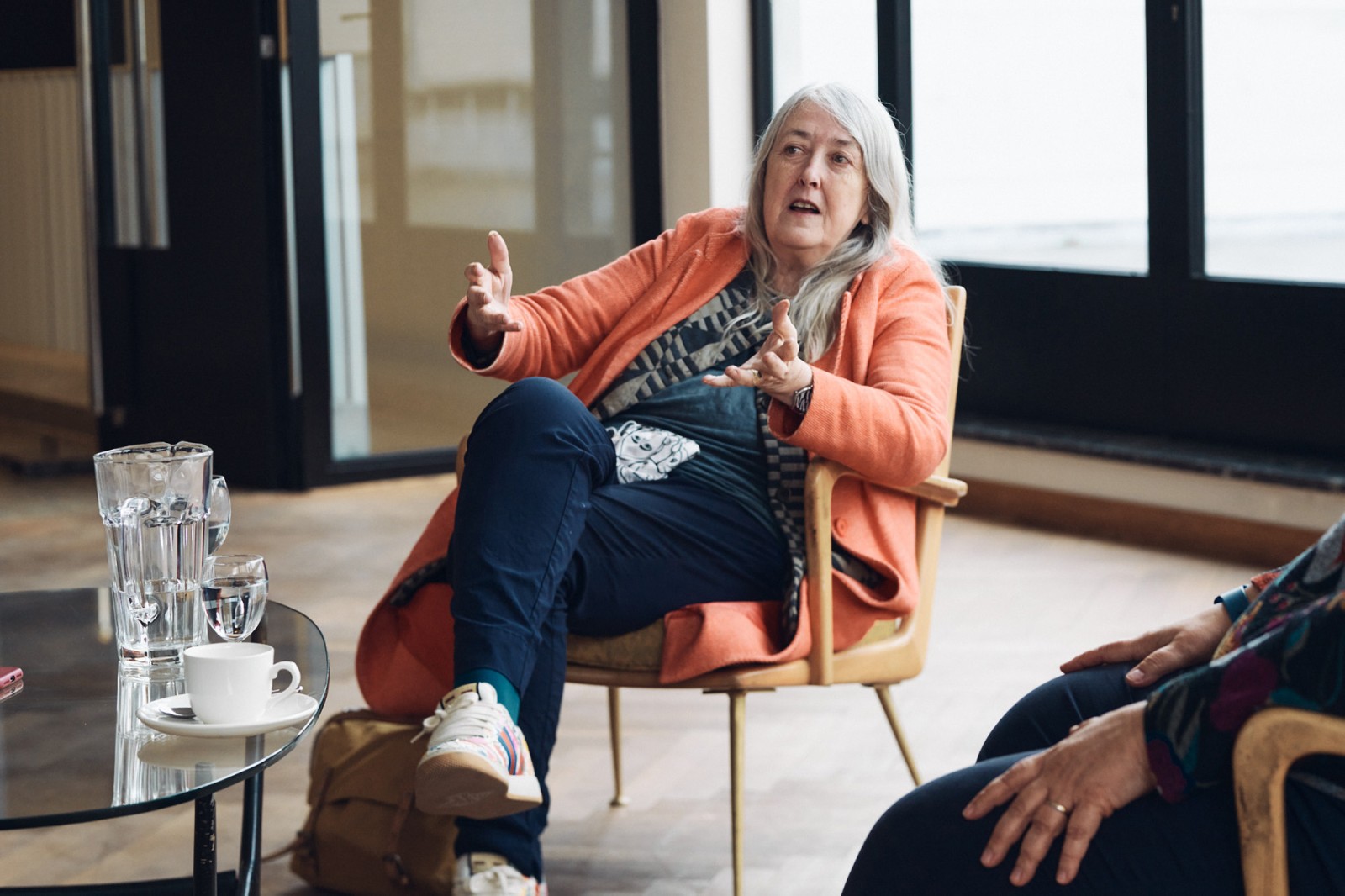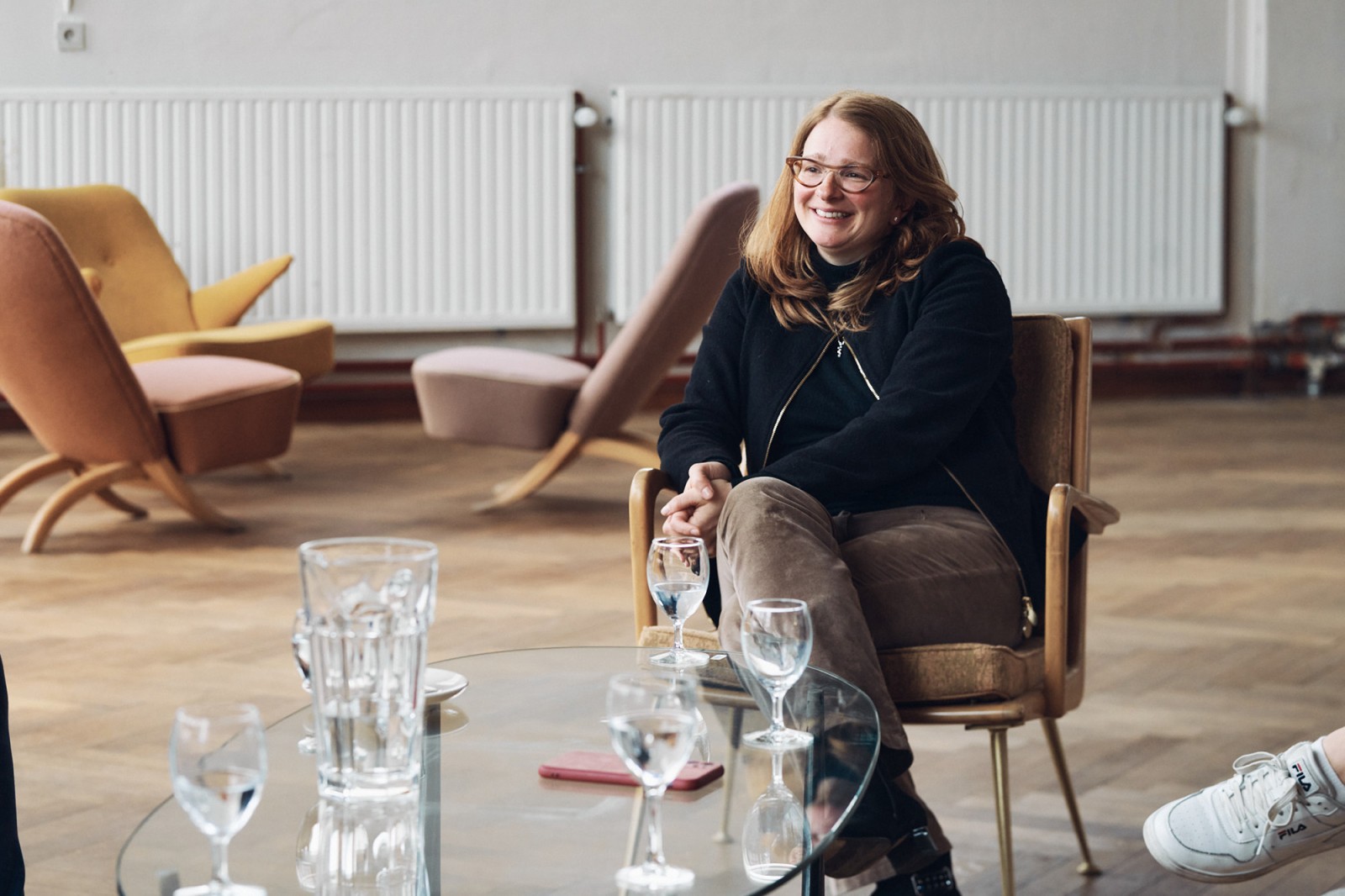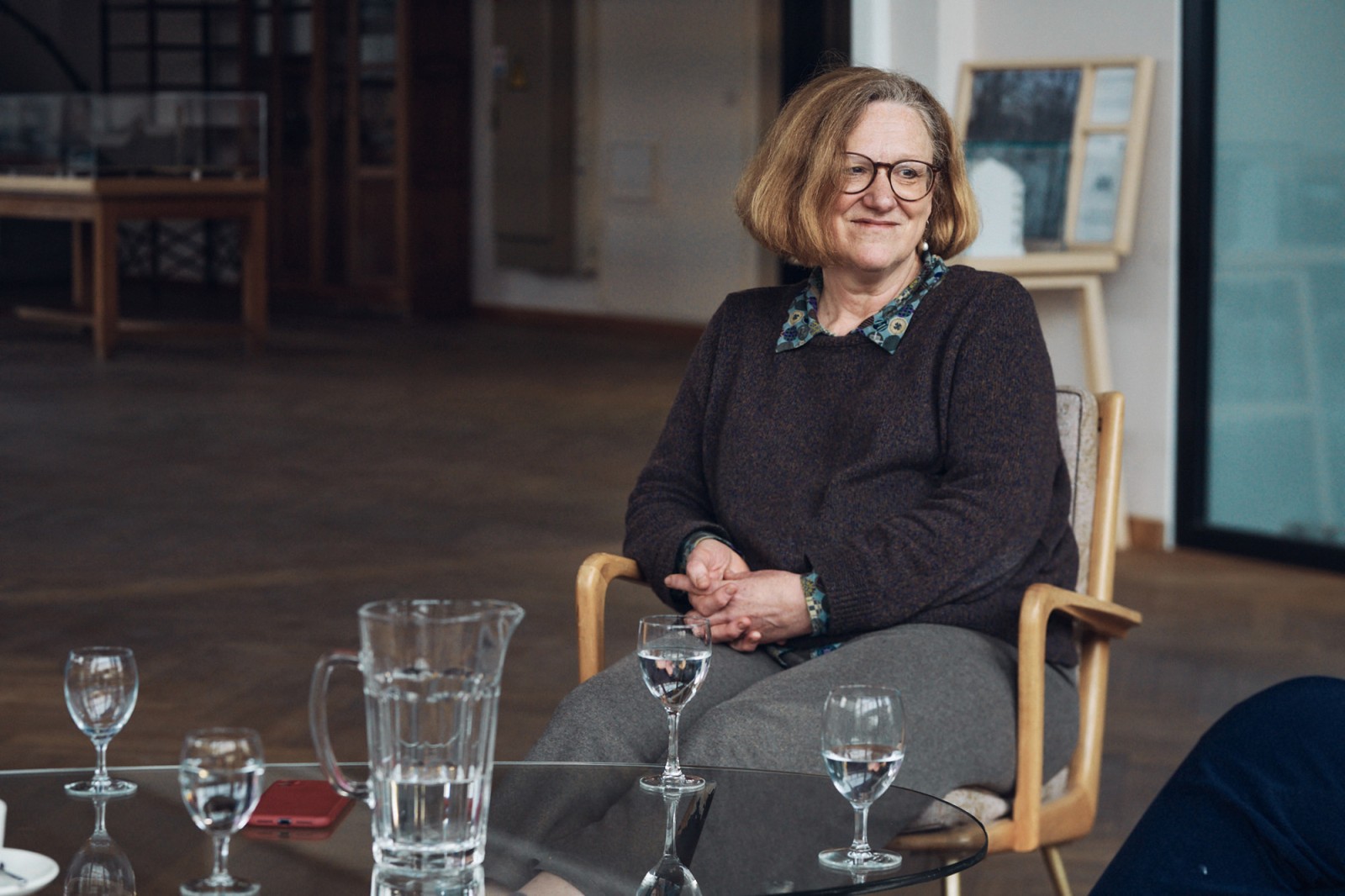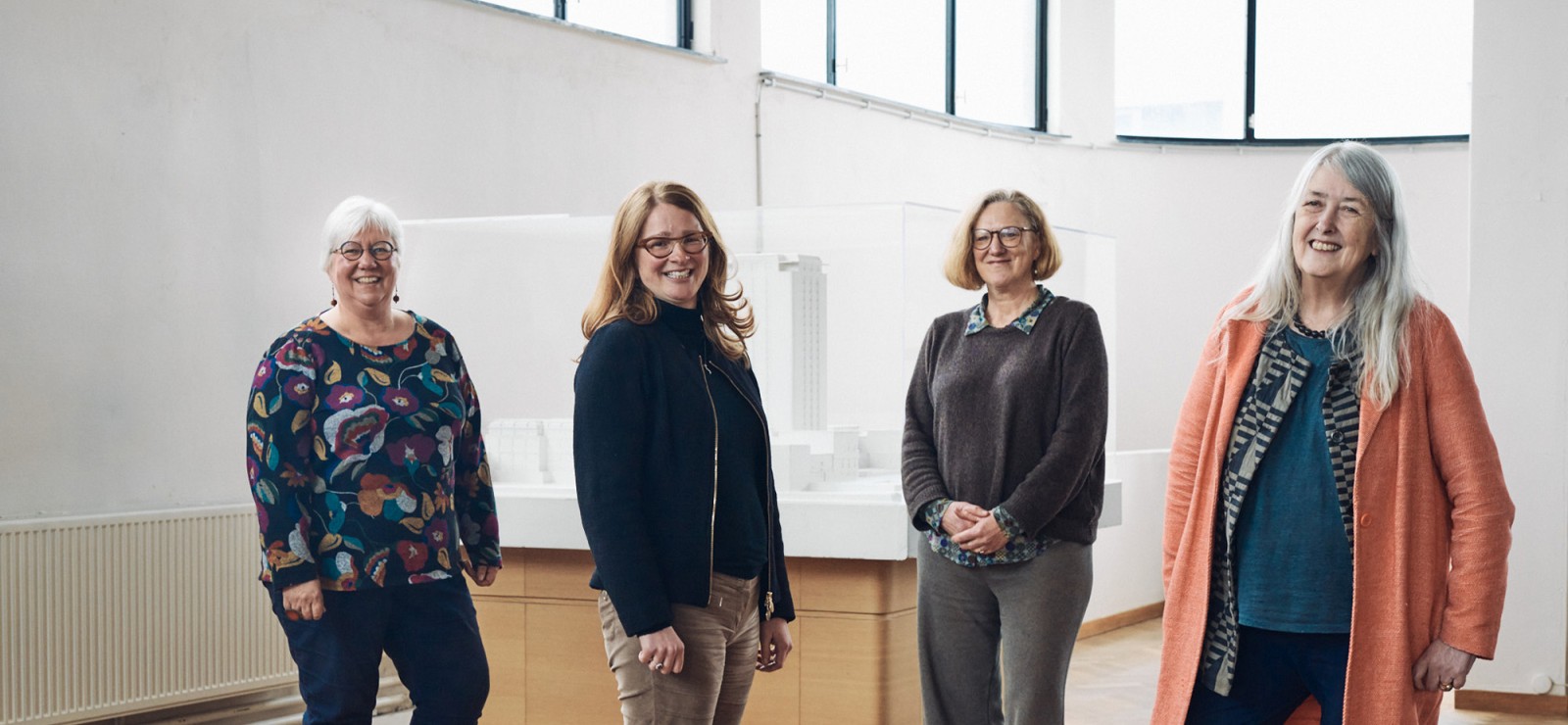Most students at university, at least at Ghent university, are female, but higher up the ladder men still dominate the academic world. The glass ceiling is still very real, but the cracks are starting to show. What obstacles do we need to tackle to create equal chances for everybody? We gather four women around the table to share their views: vice-rector Mieke Van Herreweghe, dean Gita Deneckere (Faculty of Arts and Philosophy), professor Lieve Van Hoof (Department of History) and Ghent University honorary doctor Dame Mary Beard, professor of Classics at the University of Cambridge.
Ghent University was founded in 1817, but only in 1882 the first female student, Sidonie Verhelst, enrolled. Only to leave the university after two years, even though she was a brilliant student. Natural scientist Emma Leclercq was the first woman who graduated at Ghent University, in 1885. It took nearly 100 years, until 1993, to reach gender equality within the student population, with a predominant female population today of 58%.
Times are changing
Which brings us to the question: is science still male dominated? The answer around the table is unanimous: yes, it still is. Should we lose hope for our daughters? No, they agree. Vice-rector Mieke Van Herreweghe: “It’s changing, fortunately. Not only when we talk about scientists or scholars, but also the male bias in studied topics is evolving. The current exhibition about the phallus at the Ghent University Museum is a perfect example that demonstrates how the male phallus has been researched for centuries, whilst female parts had to wait until last century to catch the attention of scientists.”
When we look at the student population, Mary Beard partly lived through a revolution, she states: “When I was a student in the late seventies, the undergraduate population in Cambridge counted 1 in 10 women, today it’s almost 50 percent. A dramatic change in 50 years’ time. And among the professors there has also been a change, but much less dramatic. In my department there are only 8 or 9 women compared to 24 men. So the evolution in undergraduates is changing the professoriate, but not enough. The higher up you go, the bigger the gap.”
But that mismatch is changing, according to Mary Beard. “In Cambridge, the last five years we noticed an increase in women as junior professors. For the whole university, they take up almost half of the positions.”

Vice-rector Mieke Van Herreweghe: "For years there has been a problem with women’s promotion. At each stage in the academic career, there were fewer women. This is generally known as the “leaky pipeline” and that’s one of the reasons why we transformed our professorial career model into a very inclusive system so that the “leaking” can be stopped."
Transform the career model
The gender stereotype that women are less ambitious than men in pursuing an academic career can be binned. But how come that higher up the hierarchy, women are still rarities? Mieke Van Herreweghe is adamant: “For years there has been a problem with women’s promotion. At each stage in the academic career, there were fewer women. This is generally known as the “leaky pipeline” and that’s one of the reasons why we transformed our professorial career model into a very inclusive system so that the “leaking” can be stopped.” A system which is already taken under consideration by Dutch universities.
Broadening the criteria for promotion indeed helps, Mary Beard adds. “Women lecturers often take up jobs within academia that don’t lead to promotion. In Cambridge we've tried to rewrite the criteria for promotion, so that those activities, which never used to be taken into account, are now criteria for promotion. We hope this will change things.”
Women convince women
Ghent University tackles this problem with structural changes in the organisation, such as quota for committees and boards, including selection committees.
Mieke Van Herreweghe: “Maximally two thirds of any committee can be of the same gender, so that in general at least one third is of the underrepresented gender, i.e. usually the female one. Research has shown that one third is necessary for people to not feel singled out and to feel more secure to express their viewpoints.”
Gita Deneckere explains: “As a dean and chair of all these commissions I see that it makes a difference. People on selection committees tend to prefer candidates with whom they can identify. That is why selection committees need to be diversified. Together with the changes in our promotion system, we can notice a substantial increase in female assistant professors and full professors in the last couple of years.”
Mary Beard agrees: “I’m on every bloody committee (laughs) because I see this really helps the next generation.”

Ghent University honorary doctor Dame Mary Beard: "I don’t share certain prejudices of my male colleagues. Or how they use words: if they say a woman seemed “rather ambitious” then they see that as a bad thing, but when a man is “ambitious”, it’s an entirely different story! I’ve done my bit in pointing that out. So I think you can help even if you are turned a bit into a bloke, as in: getting braver in speaking up."
Gita Deneckere: “Being the only woman in a homogeneous committee, didn’t that make you act like ‘one of the boys’?” Mary Beard (laughs): “That’s what I‘ve asked myself. If you are successful within a community which is broadly male and where you reach a decision-making position, have you just become a man? I think not entirely. I don’t share certain prejudices of my male colleagues. Or how they use words: if they say a woman seemed “rather ambitious” then they see that as a bad thing, but when a man is “ambitious”, it’s an entirely different story! I’ve done my bit in pointing that out. So I think you can help even if you are turned a bit into a bloke, as in: getting braver in speaking up.”
Dare to speak up!
Lieve Van Hoof: “I think it happens more to women than to men that they are not being listened to, so it’s important for women in leading positions to create an atmosphere where everyone can speak and is encouraged to speak up. I will never forget one of the defining moments in my career when our former female rector suddenly turned to me during a meeting to ask for my opinion. “Lieve, what do you think?”, she asked. By addressing me directly she got me over the threshold. Since then, I haven’t stopped (laughs).”
Mary Beard: “I recognize this. I also spent 20 years of not speaking, which is hard to believe now (laughs). When your input is ignored because you are a woman, it frustrates you up to a point that you won’t apply for a promotion or a salary raise. And that is a problem.”

Lieve Van Hoof: "I will never forget one of the defining moments in my career when our former female rector suddenly turned to me during a meeting to ask for my opinion. “Lieve, what do you think?”, she asked. By addressing me directly she got me over the threshold. Since then, I haven’t stopped (laughs).”
The importance of role models
Great unanimity around the table on the subject of role models being a key to change a system that has already been in place for decades.
Gita Deneckere: “It’s difficult to speak of personal choice in this slowly changing system. I think you need to be supported by other female colleagues to get into academia. Or by male colleagues, why not. When I was a student, there were no female professors, so I didn’t have any role models in the History Department.” Lieve Van Hoof agrees: “It’s crucial that people higher up see your potential, even if you are someone who doesn't like to promote yourself. Personally, I’m very grateful for the female ànd male professors who have supported me.”
Mieke Van Herreweghe: “Now that our promotion system is more inclusive I’m optimistic that almost all the women in the tenure track will become full professor or eventually senior full professor.” Or dean. Next academic year, five out of eleven deans at Ghent university will be women. Have we reached the tipping point to shift the balance?
Gita Deneckere: “When I was writing the book about 200 years of Ghent University in 2017, it struck me that in all that time there had only been 5 female deans. That motivated me as a feminist to stand as a candidate for the position of dean. I didn’t even have the ambition to become dean (laughs) but I wanted to change that male environment. I was elected in 2018, together with 2 other female deans, which ended a period of 18 years without any female deans.”
Transgressive behaviour, a new narrative
If you interview four women in academia on the subject of being a woman in academia, the topic of transgressive behaviour needs to be tackled. The past year, the academic world in Belgium - as in the UK - has been shaken to the core by incidents of transgressive behaviour. Twenty years ago, these incidents wouldn’t have raised an eyebrow. Today, society doesn’t accept it anymore. What has changed? Gita Deneckere: “The #MeToo movement has had a very strong impact, because it exposed the problem on a massive scale and to a global audience. I see similarities with the struggle for abortion in the 60’s, when well-known women came out with their abortion stories. Thanks to #MeToo we have discovered how many women have experienced similar transgressions, and that has taken away some of the embarrassment of talking about it. It encouraged victims to speak out and find their voice.”
Mieke Van Herreweghe: “The female voice is also more present: there are more female leaders in society, as there are more female professors at university. I think this also makes a difference.” She acknowledges the challenges in the academic context. “As a PhD student you are very much dependent on your supervisor to support you in your academic career. If something goes wrong in that precarious relationship, you find yourself in an extremely vulnerable position as a PhD student. However, the basis of our professorial career model is trust: we trust our colleagues, we trust our professors, … We treasure this trust, so we are now trying to find the right balance in how to handle cases of transgressive behaviour but at the same time avoiding a working climate of distrust.” Gita Deneckere: “I see a positive change in how supervisors perceive themselves in relation to their PhD students at the start of their careers. Younger supervisors have a different approach in coaching, with clear professional codes.”
Mary Beard: “If something goes wrong, we need to be clear about our actions, instead of sort of trying to find a balance. If institutions don’t deal with these cases correctly, they cause pain to the victim, but also to the colleagues.”

Dean Gita Deneckere: "The #MeToo movement has had a very strong impact, because it exposed the problem on a massive scale and to a global audience. We have discovered how many women have experienced similar transgressions, and that has taken away some of the embarrassment of talking about it. It encouraged victims to speak out and find their voice.”
What about the men?
Daring to speak up doesn’t only apply to women, according to Mary Beard. She raises an interesting point: "We have to set our sights on the future. Let's imagine - and this is entirely fictional - that you have a colleague who abuses power and it's a man. He's not the worst, it won’t result into criminal prosecution. Everybody knows - again, it's fictional -that he doesn’t always behave how we want him to behave. Doesn’t anyone say anything to him? Don’t his friends say anything? Why doesn’t anybody dare to confront him? Maybe there is a gender difference in this one. Women talk a huge amount about their own positioning in relation to harassment. I wonder: would men do something similar in a community of men? I just don't know. And if they do, I would love to be a fly on the wall. Would anyone dare to say: Ay, stop it mate!”
Professor Mary Beard teaches at the University of Cambridge and is regarded as one of the world's best-known classics scholars. In 2021 she was granted an honorary doctorate by Ghent University. She visited Ghent University in April 2022, which was the occasion for this interview.
Read also
The Roman Empire as eye-opener and the importance of antiquity
Is the study of antiquity old-fashioned or outdated? Far from it, says Dame Mary Beard of Cambridge University. She is one of the most famous classics scholars in the world, who has succeeded in popularizing the study of the humanities. And in the meantime, she also enriches debate on topical issues. Ghent University awards an honorary doctorate for her achievements.
Read also
Marleen Temmerman's fight for women's rights
The corona crisis has forced Marleen Temmerman - gynaecologist, ex-politician, Ghent University researcher and professor - to find creative solutions in her work in Kenya. That work is also her life’s work: improving the rights and lives of women and children. When she talks about it, you hear, above all else, her fighting spirit and faith in a better future.
Violence against women with disabilities is an under-reported problem
Violence against women, including sexual violence, is a global problem. Unfortunately, this is also the case in Flanders. Moreover, women with a disability are victims much more often than we might think. This is what postdoctoral UGent researcher Tina Goethals discovered.


